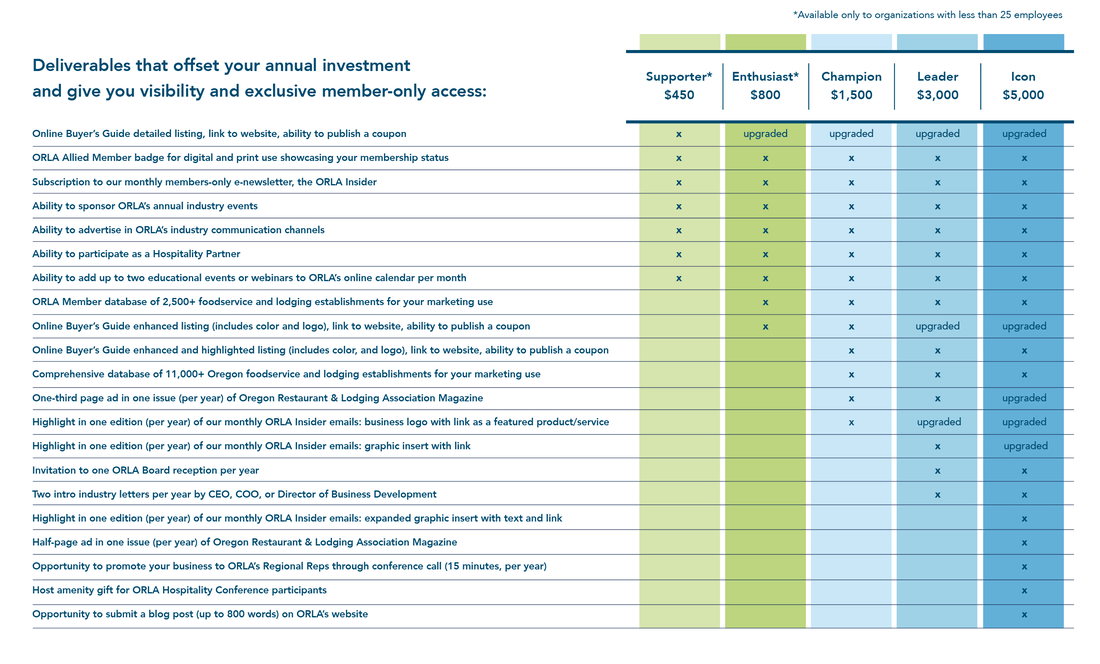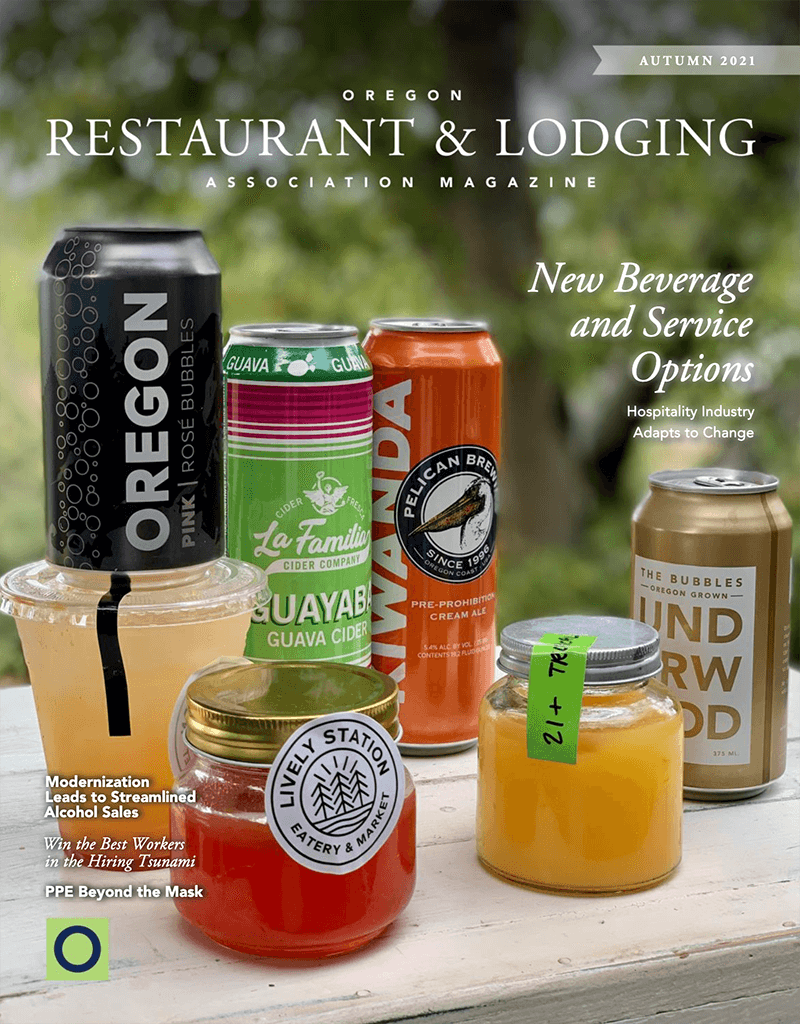Allied Membership
BECOME AN ALLIED MEMBER
Restaurant and lodging operators across the state turn to the Oregon Restaurant & Lodging Association (ORLA) for industry insights, advocacy, professional development, and cost-saving programs.
As an Allied Member, your business is placed in front of engaged decision-makers seeking trusted vendors and service providers. Membership offers referrals, relationship-building, targeted marketing, and industry events that connect you directly with potential clients.
With five tiers to match your goals and budget, now’s the time to boost visibility, expand your reach, and help grow Oregon’s hospitality industry.
Join today to strengthen connections and grow your business.
Allied Membership Affords Business-Building Benefits
Membership provides your organization access to a number of outstanding benefits intended to build business opportunities, increase sales, and put you in contact with purchasing decision makers in Oregon's foodservice and lodging establishments.
Opportunities for more engagement.
Companies interested in the potential for an endorsed relationship with ORLA beyond that of Allied Membership, or wanting to provide additional value as a Partner, must meet the criteria before consideration.
Increased visibility.
Added value with a listing on ORLA's website in the online Vendor Directory. Listing includes up to three categories with links to your website. Enthusiast level and above are afforded an enhanced listing in the digital directory.
Digital badge highlighting affiliation.
Allied members have access to an ORLA Allied Member badge for digital and print use showcasing your membership status. Log in to access more Member Resources in the Member Info Hub.
Resources to Engage With the Industry
Whether advertising in the ORLA Magazine or supporting an ORLA / Oregon Hospitality Foundation signature event through sponsorship, we have a number of opportunities for you to engage with the industry.
- Advertising & Sponsorship
- Allied Member Toolkit
- Content Submission Guidelines
- Partner & Consultant Criteria
Questions? Contact Marla McColly, Director of Business Development, at 503.428.8694.
Membership That Fits Your Goals
At ORLA, we understand that one size doesn’t fit all. That’s why we offer a range of member benefits and tiered options—so you can choose the level of engagement and visibility that best aligns with your business goals.

What Our Members Are Saying




"Being an Allied member of ORLA has significantly boosted my social media marketing agency's visibility within the hospitality industry. The opportunities and connections (the top being the annual Golf Tournament and the ORLA Hospitality Conference) provided by ORLA have allowed my business to thrive and become well-known among restaurants and lodging establishments across Oregon."
- Kara Alicia, CEO, KCreative
"On a local and individual level, ORLA does exceptional work to inform, protect and promote the Oregon restaurant and lodging community. Partnering with ORLA is the best way to advocate our Oregon businesses and our shared concerns.”
- Jake Vanderveen, CEO, McDonald Wholesale Company
“Curtis Foodservice Equipment has been a long-time Allied Partner of ORLA. We understand the importance of being a part of the industry association that works diligently at representing our customers in the Pacific Northwest, and continues to make sure that the voice of this industry is heard. We have always valued our partnership with ORLA and will continue to do so in the future.”
- Ryan McPhail, President & CEO, Curtis Foodservice Equipment
“Members of Oregon’s restaurant and lodging community are not just our customers, they are our friends and family. The beverage industry is committed to their success and growth every day. We are truly grateful for the dedication, insight, and expertise of the ORLA staff, who excel in advocating for the needs of their members.”
- Hasina Wittenberg, Executive Director, Oregon Beverage Association
We Appreciate Our Loyal Allied Members!
The following companies have demonstrated long-term support and commitment to ORLA, recognizing the ongoing value of their membership and partnership with the association.
Over 50 Years with ORLA:
- Bargreen Ellingson
- D. Michael Mills, Lawyer PC
- NW Natural
Over 40 Years with ORLA:
- Baker Commodities
- Cross Financial
- United Salad Co.
- US Foods
Over 30 Years with ORLA:
- Curtis Food Service Equipment
- Garth T. Rouse & Associates
- GeffenMesher
- Performance Reps Northwest
- Portland General Electric Co.
- Quest Investment Management Inc.
- Republic National Distributing Co. (RNDC)
- Rose's Equipment & Supply
- Willamette Valley Vineyards
Over 20 Years with ORLA:
- ABC Enterprises, Inc.
- Albany Visitors Association
- Ashland Chamber of Commerce
- Bendistillery
- Charlie's Produce
- Clackamas Co. Tourism & Cultural Affairs
- Emerald Fruit and Produce Co. Inc.
- Explore Lincoln City
- Explore Tualatin Valley
- JD Fulwiler & Co. Insurance
- Northland Furniture
- Professional Benefit Services
- Risk Strategies' Fournier Group
- Signs Now
- Visit Central Oregon






